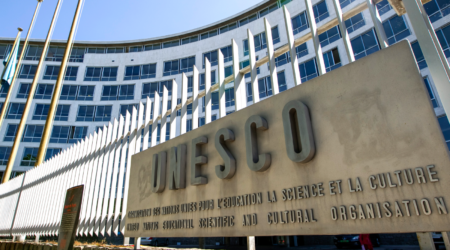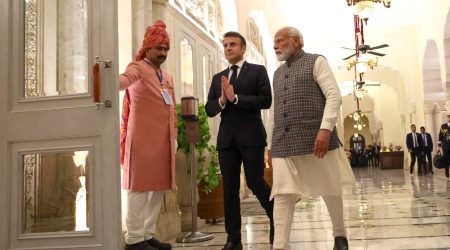By Sohail Mahmood, PhD
On April 13, Iran launched a wave of over 300 drones and missiles against Israel. Nearly all of the missiles and drones were shot down before reaching the country. Iran’s most powerful ally in the region, the Lebanese Shi’ite group Hezbollah also fired rockets at an Israeli base on April 13.
Earlier, notwithstanding the hype of an imminent direct Iranian attack on Israel, it wasn’t expected though. It was argued that Iran had never directly attacked Israel in the past for good reason. It was aware of the retaliation capacity of Israel backed by the United States. Therefore, Iran, as before, would only attack Israel through its regional proxies like Hezbollah and the Yemeni Houthis. Iran was not seeking a wider regional war, as before. Meanwhile, Israel was losing the greater Gaza war even when it was winning the battles in the last six months and counting.
The Iranian leadership is aware that a direct attack on Israel will shift the focus of the war which will hurt the Gaza cause. More importantly, it doesn’t have to directly confront Israel when it doesn’t have to and pay a huge cost in such a misadventure. The Iranian leadership was wise and pragmatic and knew its limitations.
However, Iran had to somehow avenge the Damascus attack earlier. Given the domestic pressure to avoid the killings of IRGC leadership suffered in Damascus, it would only carry out missile attacks through Lebanon-based Hezbollah and the Houthis based in Yemen. Such attacks would have been very carefully calculated to strike only some military targets and avoid civilian casualties as Iran’s leadership had stated openly that it wasn’t in any hurry to take revenge for the Damascus losses suffered by the IRGC.
Meanwhile, the Biden administration displayed tough rhetoric because of domestic pressure, especially from the Republican party, which accuses it of weakness.
In sum, it was argued that we could not expect a regional confrontation as such it does not suit anyone, neither Iran nor Israel and certainly not the US. Nor anyone else, including China and Russia, adversaries of the US. Therefore, it won’t happen. But Iran did directly attack Israel and in doing so it has now crossed a red line. This attack was a paradigm shift in the Middle East as it was the first time Iran had directly attacked Israel from Iranian territory, and the strikes set up a direct military confrontation between the two countries. Although the attack achieved little in military terms, its range “went well beyond the small-bore tit-for-tat shadow war between Iran and Israel in recent years, crossing a red line by firing weapons from Iranian territory into Israeli territory. Had defenses not held, scores or hundreds could have been killed.”
Also, for the first time, American, British, and French forces the aerial projectiles fired by Iran. Most importantly, Iran’s attack was a response to an Israeli attack on an Iranian diplomatic complex in Damascus, Syria earlier on April 1, 2024. That attack killed seven members of Iran’s Islamic Revolutionary Guard Corps (IRGC), including two senior commanders, and followed months of clashes between Israel and Iran’s regional allies, triggered by the war in Gaza.
President Biden condemned Iran’s attacks and pressed for a diplomatic response in a bid to head off further military escalation. Israel’s foreign minister said a retaliatory attack against Iran is possible. Iran’s president warned of “a decisive and much stronger response” if Israel retaliates against Iran. President Biden is now seeking to avoid further escalation leading to a wider war after Israel’s successful defense. He told Israel that the Israeli defense “constituted a major strategic victory that might not require another round of retaliation.”
As expected, the European Union and Britain strongly condemned the Iranian attack. Also as expected, the Muslim world largely didn’t do it. Turkey also warned Iran it did not want further tension in the region. Arab states Egypt, Qatar, and the United Arab Emirates urged restraint on April 14, 204. No one outrightly supported Iran in its latest actions.
The threat of another war in the Middle East foes and dragging in the US has put the region on edge, The threat has triggered calls for restraint from global powers and Arab nations to avoid further escalation. Russia, China, France, and Germany as well as Arab states Egypt, Qatar, and the United Arab Emirates urged restraint on April 14, 2024.
The Biden administration is looking to de-escalate tensions in the region. The US will continue to help Israel defend itself but does not seek a wider war in the region. President Biden has wisely indicated to Israel that the US won’t participate in any future Israeli attack on Iran, as it would create the dreaded escalation.
Meanwhile, two senior Israeli ministers signaled on April 14 that retaliation by Israel is not imminent and it would not act alone.
Iranian Army Chief of Staff Major General Mohammad Bagheri warned on television that “our response will be much larger than tonight’s military action if Israel retaliates against Iran” and told Washington its bases could also be attacked if it helped Israel retaliate.
The Iranian attack on Israel was unprecedented but knowing the country’s formidable defense capabilities, it did not seek any genuine devastation in Israel. The attack was largely meant for domestic consumption as the Islamic regime had to save face after vows of revenge while simultaneously avoiding a major new war.
The Israeli prime minister has for years advocated a tough military line against Iran, pushing the United States for harder action over Tehran’s nuclear program and its backing for Hezbollah, Hamas, and other groups in the region.
Given the harsh rhetoric in Israel, it is not a question of if, but when. The question is whether the coming attack on Iran will be symbolic, as the rest of the world wants, or whether the targets will be widespread. The problem lies in the uncertainty that these attacks will bring into the entire region.
The escalations may spin out of control. The US can certainly do more to minimize the cycles of tit-for-tat retaliations that might be coming our way. Given the tense situation, Israeli attacks on Iran will be limited to just symbolism but then Iran will also be forced to retaliate. Undoubtedly, the instability in the region will thereby increase. It is now incumbent on the US, Britain, and France who all helped Israel fend off the Iranian attacks to jointly act to de-escalate the tensions in the region. Only a two-state solution that establishes an independent sovereign Palestine can bring peace to the Middle East region. Nothing else can work. However, it won’t happen as the US, Britain, and France won’t pressure Israel to do it. Therefore, we are surely heading for more regional tensions and instability. Meanwhile, the hapless Palestinians will suffer even more. That is most unfortunate and an act of sheer injustice. We can only hope it is otherwise.
—————————————-
Dr Sohail Mahmood is a member of the Editorial Board of International Affairs Forum, Center for International Relations (CIR), Washington, DC. He also holds a Ph.D. with honors in Political Science from Northern Arizona University, Flagstaff, AZ. He hails from Lahore, Pakistan.
Disclaimer: The views expressed are not necessarily those of The South Asian Times












